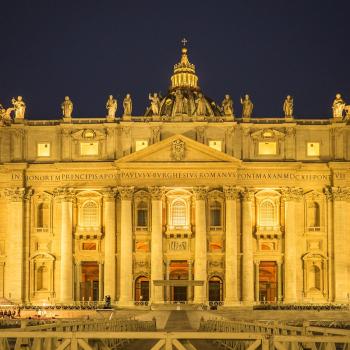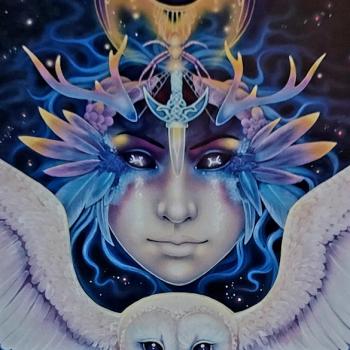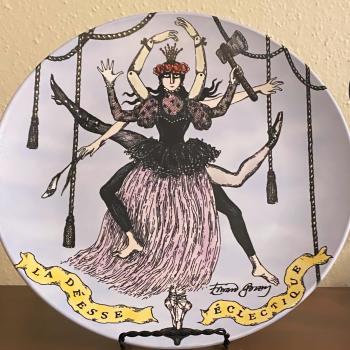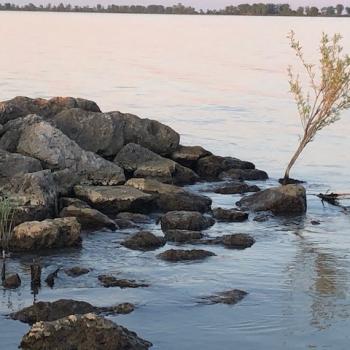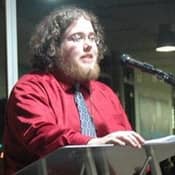She was buried in Iraq, the British cemetery, probably around 1980. Brain tumor. It had taken them by surprise; everyone knew she had been sick, had been having health problems since she last lived in America, years before. But nobody knew about the tumor, except, presumably, her husband. An unexpected death in a foreign land, a burial in unfamiliar soil.
She had an ankh on her tombstone. I'm sure nobody realized the Pagan intent of the sigil—again, except for her husband. No crosses or Stars of David were allowed in the British Cemetery in Baghdad, but they let her have an ankh above her name: Carolyn Alldrit.
She was my great-grandmother, of sorts, dead before I was born. And still I seek her.
* * *
I have spent the past few months engaged in furious Googling, a search that has led me to stumble through British court notices and birth certificates and decades-old Usenet posts—anything I can connect to the names of the founders of my mother coven, Deryk and Carry Alldrit. I'm not sure what's brought about this current mania for family history. I can't think of anything that's happened to me recently to provoke it. But for some reason, I now have this urge clawing at the base of my skull to discover more about where I come from.
And it is a maddening search. I know little enough about how to navigate the system of American records, much less how to use the English rolls. Add to that the inconsistency of spelling (Deryk? Derrick? Derek?) and the bare sketches of timelines I am drawing from (just how old were these people?), and my hopes of discovering anything conclusive remain slim. But I've kept searching. I have to know.
I've written a little about my lineage before. My family's coven, Pleiades, is the daughter of a coven called Watersmeet, which was founded by an Englishman named Deryk Alldrit and his American wife, Carry, in the mid-1970s. Unfortunately, not many people who actually knew Carry and Deryk remained in the area long enough for me to meet them. I've asked around a little bit, but the generation I think of as my elders—my parents' generation—came into Wicca after Deryk and Carry had already been gone for years. If I have the chronology correct, more time has passed since my own initiation into the coven when I was 19 than passed under Carry and Deryk's reign as high priestess and priest.
The few stories I've heard about my ancestors are mainly about their time in America—to be expected, I suppose, since that's where all the first-hand information comes from. And those stories are fascinating and often full of slapstick: there is a tale of how once, during a Drawing Down the Moon ceremony, Carry swung the ritual sword close enough to the congregants that the men feared an expected circumcision, leading them to tie football helmets around their waists the next time the coven convened. Stories of Deryk's dry British wit, and Carry's scatterbrained personality (in hindsight, a trait made a bit darker in light of her condition.) But those stories only added up to a handful of paragraphs; enough to have a slight inclination about what these people were like, but little more than that.
The bits of information I have about Deryk's life before he founded Watersmeet are even more intriguing—the claims that he was initiated in the '30s, that he was a Stonehenge Druid, that he had known Alex Sanders. I don't know how far I believe some of those claims—the 1930s seem awfully early—but the mere existence of those stories hints at a vivid, barely known history.
As always, I try to temper my feelings. It does no credit to either the Alldrits or myself to build them into legendary figures. Some of the stories I've been told portray them as holding very different mindsets about the Craft than I do.
But still, this thought is ever-present in my mind. If Deryk hadn't brought his strand of Wicca from England. . . If Deryk hadn't come to St. Louis for his work. . . If they hadn't started Watersmeet. . .
In so many ways, I owe everything I am to these two strangers.
Who were they?
* * *
The only name I have for the mother coven—the one from which Watersmeet was born—is the Coven of the Rollright Stones. Which isn't much help, honestly. Like all the various megalithic structures in England, the Rollright Stones have been a magnet for modern Pagans since the movement began. I'm sure there have been a dozen covens of the Rollright Stones over the years. Searching there hasn't turned up much—nothing about Deryk or Carry, nothing about the mother coven, nothing about my greatest, unspoken hope—the idea that perhaps a sister coven to my own still exists, somewhere in Mercia, as ignorant of our shared lineage as are of them. Nothing turns up, except for pretty pictures of boulder formations with names like the King's Men and the Whispering Knights.
But oh, those pictures. I see the green grass and the white stone, and all my mind is given over to longing. I see the Rollright Stones and I see the ghosts of those who crafted me without ever knowing my name. I see those stones—stones I have never seen myself, but from where my life springs, like the ankh on Carry's tombstone—and my heart aches for home.
12/2/2022 9:09:58 PM
